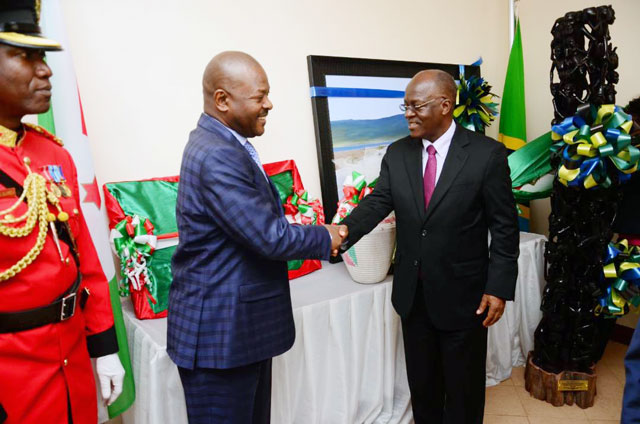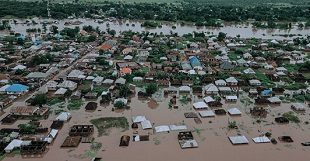
In January 2016, barely two months into his term, his administration announced that state TV would no longer broadcast live parliamentary proceedings, officially as a cost-cutting measure.
The opposition saw this as censorship as it was among the few ways it could hold the government to account. It planned demonstrations against the ban, but the government responded by banning all protests.
Another example of such censorship was Magufuli’s response to a 2017 song by popular Tanzanian rapper Nay wa Mitego. Less than a day after its release, Mitego found himself in police custody.
He was accused of insulting the president and maligning the government for his song which included the prescient lyrics: “Is there still freedom of expression in this country?” the raspy-voiced artist, whose real name is Emmanuel Elibariki, had rapped. “What if I speak and later find myself at Central [Police Station]?/Are there leaders who make stupid decisions?/ There are!”
The fear he sang about had come true – he was indeed detained at the Central Police Station in Dar es Salaam.
Although President Magufuli ordered Nay wa Mitego’s release just a day later, he advised that the song should be reworked to include lyrics about other problems in the society, such as tax cheats.
In 2017, opposition MP Tundu Lissu, who three years later ran against Magufuli for the presidency, was shot and seriously injured outside his home.
Lissu accused the state of trying to kill him and he was charged with hate speech for calling the president a dictator. The government denied any involvement in the attack.
In what was seen by human rights groups as curbing press freedom, the president’s administration suspended newspapers. Amnesty International also said that journalists feared being targeted.
Huge tax bill
Magufuli’s administration continued to roll out a cocktail of bold and unusual directives, introducing new laws intended to increase revenue from multinational mining firms.
In 2017, Acacia Mining, a subsidiary of Canadian parent company Barrick Gold, was slapped with an incredible $190 billion tax bill over royalties the government said it owed, though it denied any wrongdoing.
As part of the settlement, Barrick eventually agreed to pay $300 million after buying out Acacia, and a new operating company, Twiga Minerals, was formed with the government owning 16% of the joint venture. Barrick and the Tanzanian government also agreed to the sharing of unspecified future economic benefits from the mines on a 50-50 basis.
Then there was his highly contentious scuppering of an attempt to overturn the stipulation that pregnant schoolgirls be expelled.
And in 2018, Tanzania passed a law to punish anyone questioning official statistics, making the state the sole custodian of data. The World Bank said the changes were “deeply worrying”.
But even his critics agree that Magufuli contributed to Tanzania’s development, investing in several large infrastructure projects such as the creation of a standard gauge railway to connect the country with its regional neighbours, the expansion of major highways, and the construction of a bus rapid transit system in the commercial hub of Dar es Salaam. He also increased electricity production to the grid which reduced the need for power rationing. And he revived the state-run national airline, Air Tanzania.
He styled his governance after Tanzania’s first president, Mwalimu Julius Nyerere, who was always fiercely independent. And this appeared to inform his approach to coronavirus.
“Our founding father was not someone to be directed to be told what to do… Those who devise these kinds of rules (lockdown) are used to making these directives that our founding father refused,” Magufuli said, referring to Nyerere’s habit of rejecting advice coming from Western nations, who the committed socialist distrusted.
‘I know what it means to be poor’
Magufuli grew up under Nyerere’s rule in a village in north-western Chato district along the shore of Lake Victoria, and says his modest background inspired his own desire to work for the Tanzanian public.
“Our home was grass thatched, and like many boys I was assigned to herd cattle, as well as selling milk and fish to support my family,” he said during his 2015 campaign.
“I know what it means to be poor. I will strive to help improve people’s welfare,” he added.
After school he worked for a year as a senior school maths and chemistry teacher before returning to further education. He worked for a few years as an industrial chemist before resigning in 1995 to run for the parliamentary seat in his own Chato constituency.
After taking that seat, he quickly rose through the ranks to be appointed deputy minister for public works.
The department’s senior minister, Mama Anna Abdallah, says his no-nonsense style, focused on efficiency and results, was quickly evident. In his first year in the job he succeeded in steamrolling through the building of a long-delayed road.
By 2015, Magufuli wanted to run for the presidency. He is said to have been considered a consensus candidate for the Chama Cha Mapinduzi (CCM) party – which had been in power for 54 years.
The elections were the tightest in the country’s history, but Magufuli pulled ahead to win with 58% of the vote.
He won his second term with 84% of the vote, but the main opposition parties denounced the result as fraudulent.
Calls for other regional leaders to emulate Magufuli’s style diminished as he faced criticism from political opponents, civil society and Western countries, who said he was oppressing the opposition, curtailing press freedom and holding foreign companies to ransom.
But as a president who often styled himself as an African nationalist and devout Catholic waging war against foreign powers seeking to exploit the East African nation, he was not perturbed by such censure.
This may have steered his attitude towards dealing with the pandemic, an attitude that will forever colour the way Magufuli will be viewed.
John Magufuli at a glance
Born in Chato, north-west Tanzania, in 1959
Studied chemistry and maths at the University of Dar es Salaam
Worked as a chemistry and maths teacher
First elected as an MP in 1995
Became a cabinet minister in 2000
First elected president in 2015
Won second term in 2020
****
Source: BBC
 The Independent Uganda: You get the Truth we Pay the Price
The Independent Uganda: You get the Truth we Pay the Price

